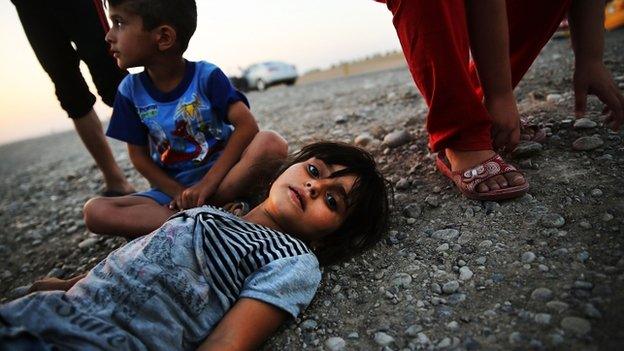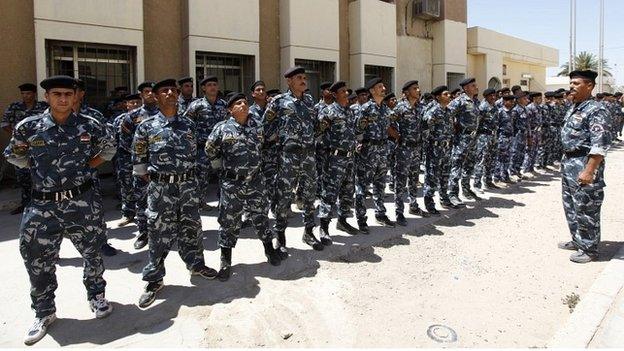'Jihadistan': Can Isis militants rule seized territory?
- Published
In 60 seconds: What does Islamic State want?
Can Isis - the small but fanatical jihadist army now controlling large tracts of Syria and Iraq - rule the lands it has conquered?
Since the beginning of June, Isis - which has recently rebranded itself as "Islamic State" - has burst out of its stronghold in eastern Syria to seize Mosul, Iraq's second city, then advance down the length of the Euphrates Valley to threaten the edge of Baghdad itself.
Wherever it has taken over, its black-clad and balaclava'd fighters have imposed a draconian version of Sharia, or Islamic law, prompting thousands to flee as refugees.
Analysts point out that seizing territory is one thing, governing it is quite another.
But given the internal problems and weaknesses besetting both the Syrian and Iraqi states, there is no sign that Isis is about to be dislodged soon. So, are they actually in a position to rule?
That, of course, depends on many factors - local tribal support, economic viability, access to fuel and water, perceptions of their religious authority and that of their leader and self-appointed caliph, Abu Bakr al-Baghdadi, and whether or not Isis overreach themselves.
'Punching above its weight'
So far, Isis has enjoyed phenomenal short-term military success, largely through a combination of fear and firepower.

More than a million people have fled their homes as a result of the recent conflict in Iraq
Even if they were crushed tomorrow, military historians are unlikely to forget the effect of their blitzkrieg "psyops" campaign, the Isis psychological operation to terrify their opponents by flooding social media on the internet with gruesome images and videos of what happens to their enemies.
The sight of beheadings, crucifixions and summary executions, all filmed with a ghoulish commentary, was enough to make Iraq's poorly motivated security forces lay down their weapons and flee last month.
But Isis has effectively been "punching above its weight", to use a boxing analogy.
As the remnants and successors to a badly damaged "al-Qaeda in Iraq", the group had only about 10,000-15,000 fighters at most when it began taking over much of western Iraq in June.
Reportedly, Isis took over Mosul with no more than 800 fighters. But these were just the shock troops.
Isis' fortunes were, and still are, heavily dependent on the support of local tribes and militias, without whom they could not hope to hold down a city of two million like Mosul.
"Isis' ability to control lands has been based on deals with local militants willing to do the 'ruling' for them," says Mina al-Orabi, assistant editor of pan-Arab Ash-Sharq al-Awsat newspaper and originally from Mosul herself.
"Some of these deals are based on fear, others on a temporary meeting of interests, at times it is as crude as financial deals being struck between different gangs," she adds.
Maintaining power, order and loyalty in the longer term will mean keeping those interests onside and sufficiently "invested" in rule by Isis.
Learning from mistakes
The last time jihadists ruled a sizable chunk of Iraq for a sizable amount of time was when Isis' predecessors held sway over much of Anbar province in 2006, and they blew it.

Volunteers have been signing up to join the Iraqi army amid fears that Isis could attack Baghdad
Under the crude, brutal, and sadistic leadership of the Jordanian ex-convict, Abu Musab Al-Zarqawi, the jihadists managed to alienate most of the local population.
They cut off the heads of Sunni sheikhs who refused to pledge allegiance, they blew up Shia mosques, trying to start a sectarian civil war, and they cut off the fingers of people they caught smoking (a practice they deem as un-Islamic).
This did not exactly win them hearts and minds.
Stop persecuting your fellow Muslims, implored al-Qaida's leadership back in Pakistan, but it was in vain - al-Zarqawi ignored his nominal masters.
In the end, Jordanian intelligence tracked him down, he died in a US airstrike and the jihadists were driven out by the local tribes backed by a "surge" of US troops.
Eight years on and the jihadists of Isis are firmly back in Anbar after a spectacular squandering of the advantage by the Iraqi government of Prime Minister Nouri Maliki, who sent troops to besiege a protest camp in Falluja late last year.
So has Isis learned from the mistakes of its antecedents?
Ask some of the residents of Raqqa in north-east Syria, where Isis has been in control since May 2013, and they would say "no".
Stories abound of harsh punishments imposed for the slightest of offences, women being confined to the home, public crucifixions, kidnappings and extortionate levies imposed on businesses.
Once again, al-Qaeda's much diminished leadership scolded Isis or its excesses, and in February they formally disowned the whole organisation.
Oil and water
But others under Isis rule tell a different story.

Reports have filtered out of efficient municipal garbage collection, safer streets, generous distribution of fuel and food to the poor.
Sound familiar? This is exactly how the Taliban started out in Afghanistan in 1994, gradually increasing their territory until the 9/11 attacks on the US provoked the campaign that drove them from power in 2001.
One of the biggest advantages for a puritanical, religiously-cloaked militant organisation like Isis is the poor governance and perceived corruption of its secular alternative - the national government of Iraq.
To succeed as a viable state, let alone as a transnational "caliphate", Isis will need access to oil and water.
It has both. In Syria its forces control the oil-producing region around Deir Az-zour, including Syria's largest oilfield at al-Omar, reportedly even selling oil to their enemies, the Assad regime itself.
They also control Syria's largest dam, the Tabqa Dam at Lake Assad.
In Iraq they control the Falluja dam and have some, disputed, access to Iraq's largest oil refinery at Baiji. In a part of the world where oil and water are the two key commodities, Isis finds itself in a powerful position.
'Jihadistan'?
Leaving aside for now whether or not the wider Muslim umma (community) will accept the recently proclaimed khilafa (caliphate) of Isis - and it has been swiftly denounced by many Muslim scholars - the fact remains that Isis controls a large area of the Middle East and it is not going away.
Neither the forces of President Assad in Syria, nor the forces of the Iraqi government alone can dislodge Isis from the ground it has taken, it is too well entrenched.
Syrian air strikes will have some impact, so will Iraq's newly bought Sukhoi-25 jets and assistance from the US and Iran, but ultimately this is about holding onto territory on the ground.
The only force capable of permanently ejecting Isis will be the tribes in those regions, and they have little incentive to do so while the Syrian civil war rages on and a non-inclusive government sits in Baghdad, led by a Shia prime minister perceived as discriminating against Sunnis.
Which leaves the prospect of a violent, extremist, well-armed, well-funded and religiously intolerant militia becoming a permanent part of the Middle East landscape, a sort of de facto "jihadistan".
Would it stop there?
Unlikely. As far back as last year its adherents were proclaiming their ultimate aim of conquering territory as far away as Spain (ruled by Muslims for centuries as al-Andalus), Austria and China.
Even if Isis remained within the boundaries of the areas it has taken so far, it would likely be a springboard for attacks on neighbouring countries like Jordan and Lebanon, as well as attracting hundreds of young jihadists from the UK and the wider West.
Shiraz Maher, an expert on the Syrian jihad at King's College London, says there is little appetite for concerted international action to dislodge them.
"The fact Isis has taken a large amount of territory is not unique. We've seen jihadist organisations achieve this in the past, for example, in Afghanistan and Pakistan, the Horn of Africa, and Mali most recently.
"In every one of those cases, Western-backed intervention tipped the balance against jihadist gains. That's the key difference here. Both Iraq and Syria are failed states with ineffective armies, and there is no appetite in the West to intervene."
Isis, concludes Mr Maher, could therefore continue to hold their ground, ruling an area the size of Pennsylvania for the foreseeable future.
But Mina al-Orabi believes there are signs that Isis deals with local militants are already starting to unravel, meaning:
"Isis can only rule depending on brute violence or the threat of using it."